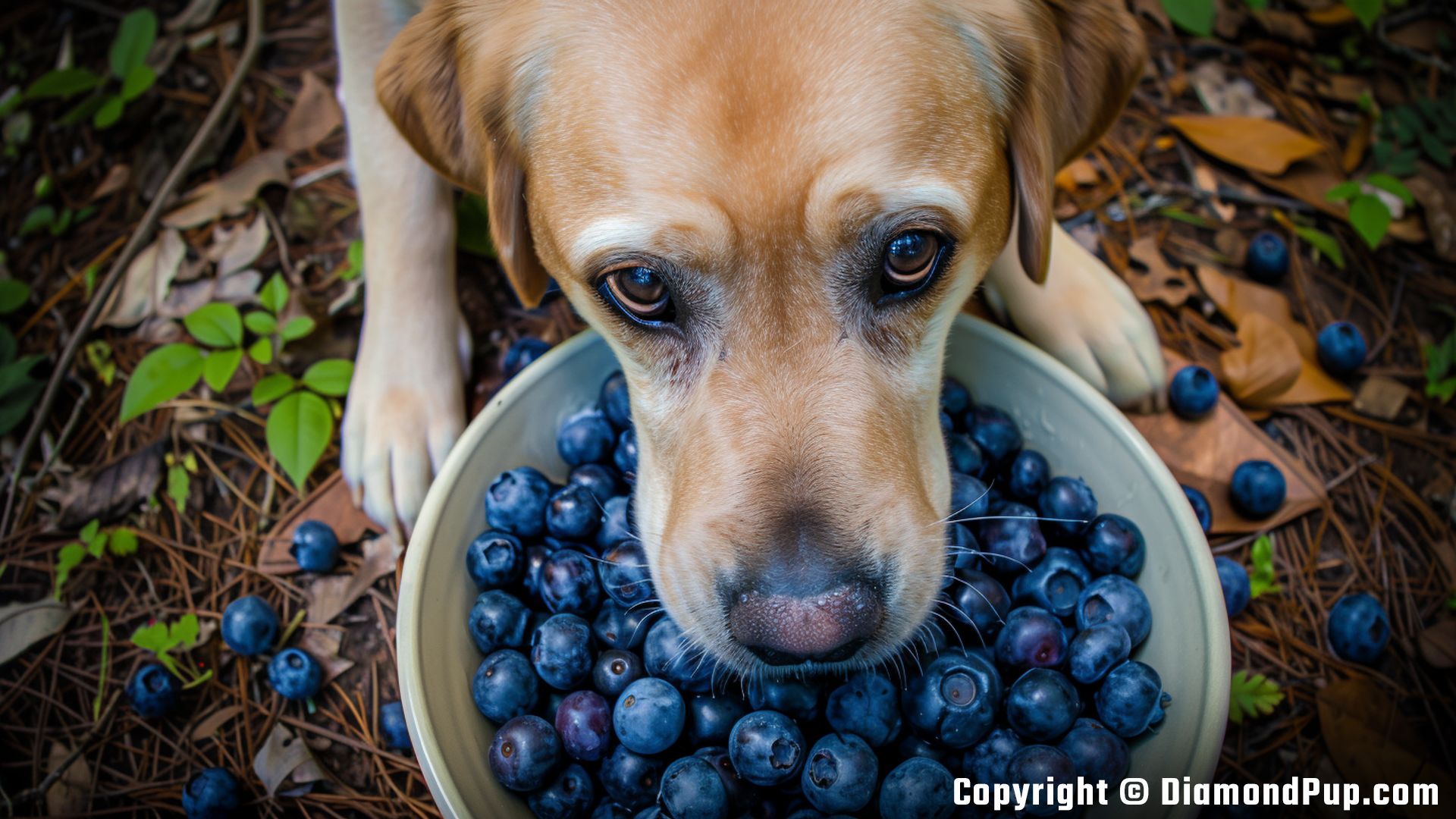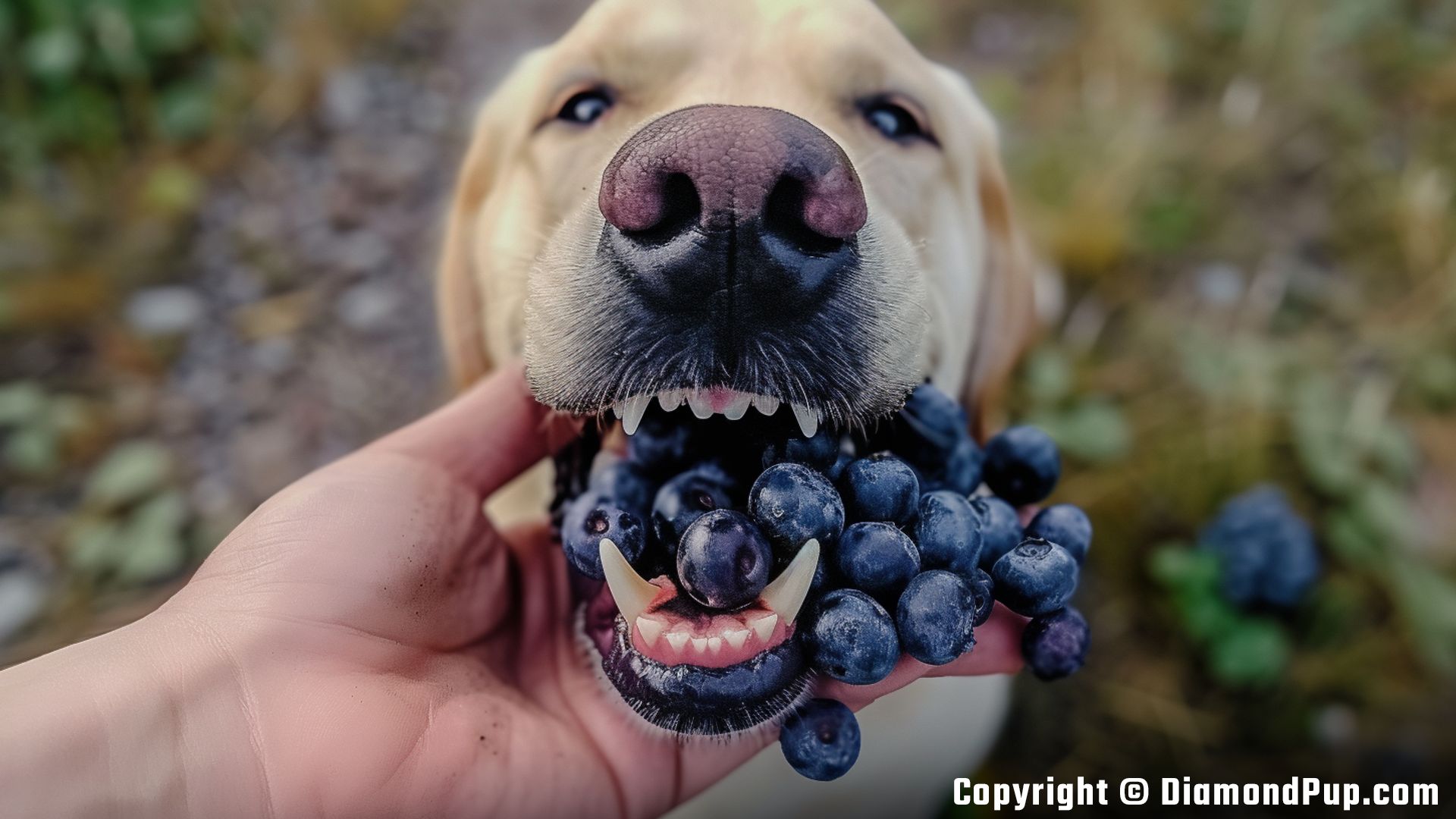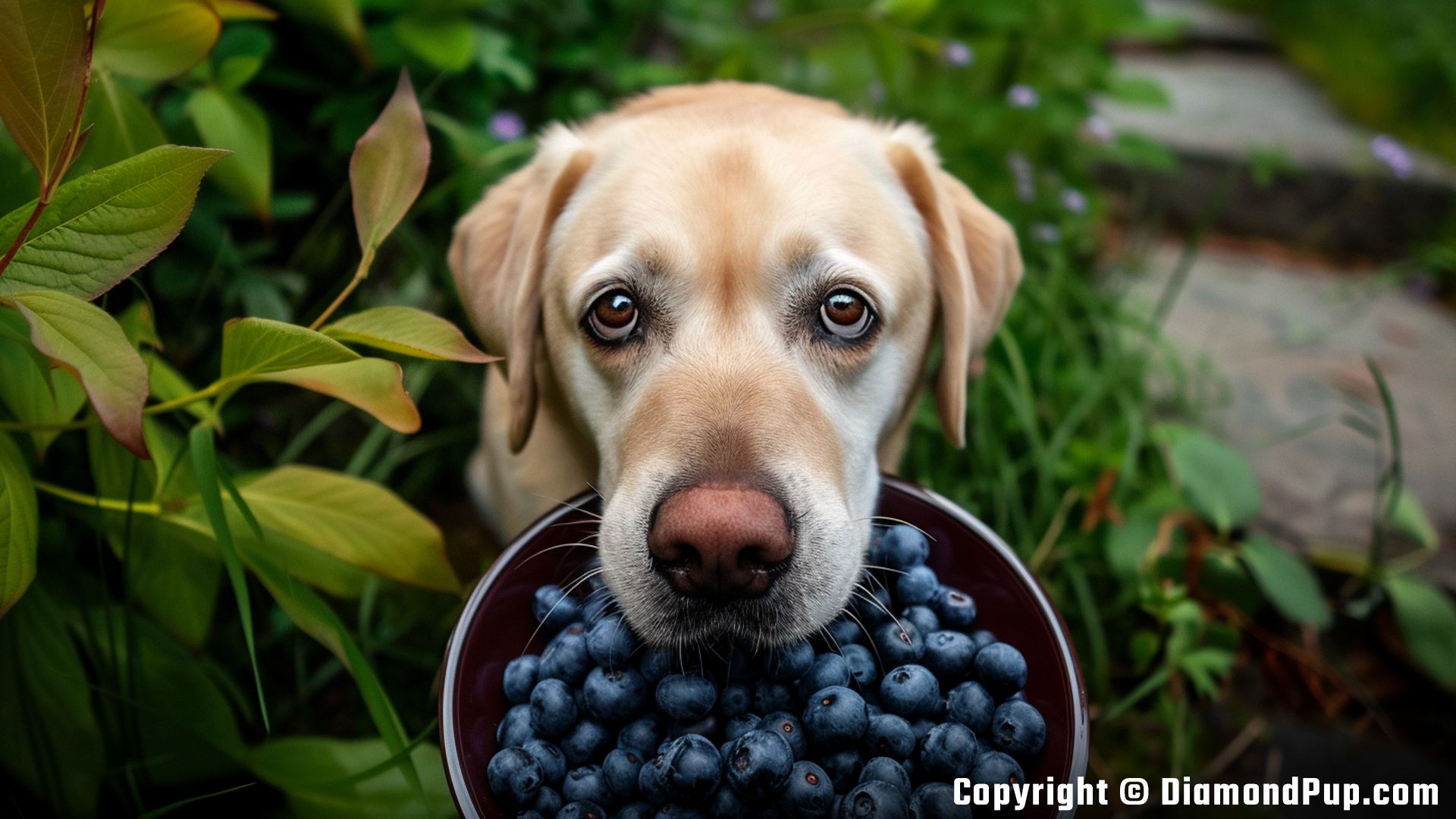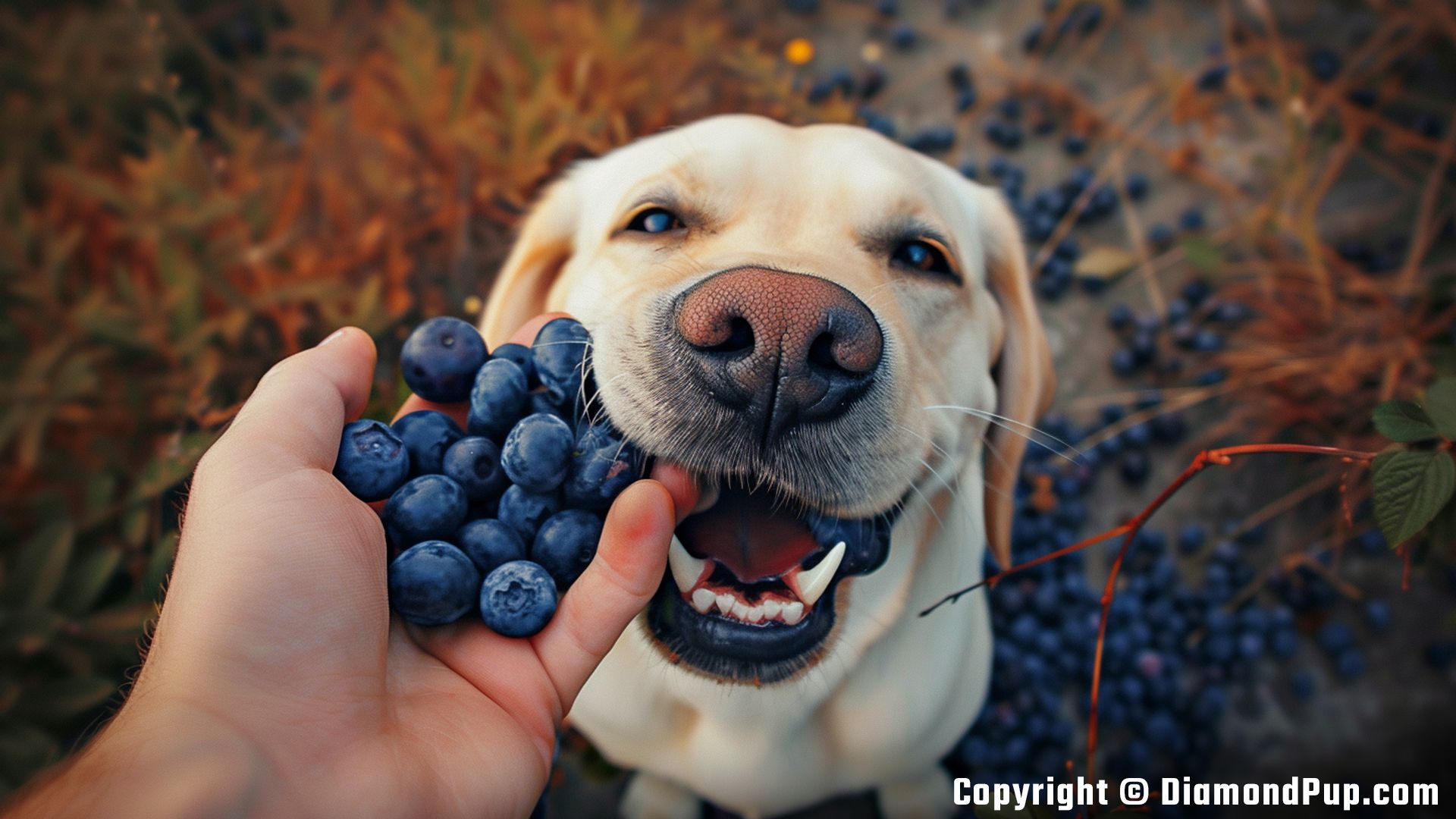Can a Labrador Eat Blueberries?
Date Published: February 12, 2024 | Last Modified: February 16, 2024
Before we delve into the nitty-gritty details, let's establish a simple truth - blueberries can indeed be a nutritious addition to your Labrador's diet. In this article, we will explore the various health benefits that blueberries can offer to your beloved furry friend, as well as discuss the potential pros and cons of incorporating these delicious berries into their meals. Additionally, we will address any safety concerns you may have, including whether blueberries are toxic to Labradors. By the end of this read, you will have a clear understanding of whether blueberries are good for your Labrador's overall well-being.

Are Blueberries Good for Labradors?
Labradors can indeed enjoy the occasional banana as a healthy treat. Bananas are a good source of essential nutrients such as potassium, vitamin C, and vitamin B6, which can contribute to your Labrador's overall health. However, it's important to remember that bananas should only be given in moderation, as they are also high in natural sugars that can lead to weight gain if consumed excessively. Always remember to peel and chop the banana into bite-sized pieces to prevent choking hazards.
As with any new food introduction, it's recommended to start with small quantities to ensure that your Labrador tolerates bananas well. Keep in mind that every dog can react differently to certain foods, so it's best to monitor your dog for any signs of gastrointestinal upset or allergic reactions. If you have any concerns about feeding bananas to your Labrador, consult with your veterinarian for personalized advice based on your dog's individual dietary needs.

Understanding the Benefits of Blueberries for Labradors
Labradors can indeed enjoy the benefits of blueberries in their diet. These delicious berries are packed with antioxidants, which can help boost your furry friend's immune system and reduce inflammation in their body. Additionally, blueberries are a great source of fiber, which can aid in digestion and promote a healthy gut. This is especially important for Labradors, who are prone to obesity and gastrointestinal issues.
Furthermore, blueberries contain vitamins C and K, as well as manganese, which are all essential for your Labrador's overall health and well-being. When choosing the best food for your Labrador, consider incorporating fresh or frozen blueberries as a nutritious treat or topping to enhance their meals.

Nutritional benefits of Blueberries for Labradors
When it comes to Labradors, bananas can be a healthy and tasty treat to add to their diet. Bananas are rich in essential nutrients such as potassium, vitamin C, and vitamin B6, which can help support your Labrador's overall health. Potassium is important for maintaining proper muscle function and heart health, while vitamin C is a powerful antioxidant that can boost their immune system. Additionally, vitamin B6 plays a key role in supporting their metabolism and overall energy levels.
However, it's important to remember that bananas should only be given to Labradors in moderation, as they are higher in natural sugars. Too much sugar can lead to weight gain and digestive issues in dogs, so it's best to offer bananas as an occasional treat rather than a daily staple in their diet. Always consult with your veterinarian to determine the appropriate portion size for your individual Labrador based on their age, weight, and overall health status.

Safely Introducing Blueberries to Your Dog's Diet
When it comes to safely introducing blueberries to your Labrador's diet, it's essential to start with small quantities. While blueberries are generally safe for Labradors to eat, too much of any new food can potentially upset their stomach and cause digestive issues. Start by offering just a few blueberries as a treat or mixing them into their regular food to see how your Labrador reacts. Monitor their stool for any changes, and if everything seems well, you can gradually increase the amount over time.
It's also crucial to wash any blueberries thoroughly before feeding them to your Labrador to remove any pesticides or residues that may be present on the fruit. Organic blueberries can be a good option to minimize the risk of exposing your dog to harmful chemicals. Remember to always consult with your veterinarian before making any significant changes to your Labrador's diet, including introducing new foods like blueberries.

How much blueberries can a dog eat safely?
When it comes to feeding your Labrador bananas, moderation is key. While bananas can be a healthy and tasty treat for your furry friend, it's important not to overdo it. A general guideline is to feed your Labrador small slices of banana as an occasional snack, rather than making it a regular part of their diet. Too much banana consumption can lead to an upset stomach or potential weight gain, so it's best to treat it as an occasional indulgence.
As a Labrador owner, you may want to consider incorporating bananas into their diet as a special reward during training sessions or as a healthy alternative to store-bought treats. Just remember to keep the portions small and monitor how your dog reacts to this new addition to their meals. Observing any changes in their digestion or behavior can help you determine the right amount of bananas for your Labrador to enjoy safely.

Tips to Remember When Feeding Your Dog Blueberries
When feeding your Labrador blueberries, it's important to remember that moderation is key. While blueberries are a healthy treat for your furry friend, too many can lead to an upset stomach or diarrhea due to their high fiber content. Aim to incorporate blueberries as an occasional snack or mix them in with their regular meals to add some variety to their diet.
Another tip to keep in mind is to always wash the blueberries before serving them to your Labrador. This helps remove any pesticides or harmful bacteria that may be present on the berries, ensuring that your pet stays safe and healthy. By following these simple guidelines, you can enjoy watching your Labrador happily munch on delicious blueberries without any worries.

Feeding Your Dog Blueberries
When it comes to feeding your Labrador, blueberries can be a nutritious and delicious treat to incorporate into their diet. These small berries are packed with essential vitamins and minerals, including vitamin C, vitamin K, and manganese. Vitamin C is important for your dog's immune system and skin health, while vitamin K is essential for blood clotting. Manganese plays a key role in bone health and metabolism. The fiber content in blueberries can also aid in digestion and promote a healthy gut.
However, it's important to remember that blueberries should only be given to your Labrador in moderation. While they offer many benefits, too much of a good thing can lead to digestive upset or weight gain. As a general guideline, you can offer your Labrador a few blueberries as an occasional treat, alongside their regular balanced diet to ensure they receive all the necessary nutrients for optimal health.

How to properly feed your dog Blueberries
When it comes to feeding your Labrador blueberries, moderation is key. While blueberries are packed with essential vitamins, minerals, and antioxidants that can benefit your dog's health, they should only be given as a treat and not as a replacement for their balanced diet. Aim to offer your Labrador a few blueberries a couple of times a week as a special snack. Too many blueberries can upset your dog's stomach or cause diarrhea due to their fiber content, so it's important to monitor their intake. Always wash the blueberries thoroughly and remove any stems before feeding them to your Labrador.
Remember that every dog is different, and some may have allergies or sensitivities to certain foods, including blueberries. If it's your Labrador's first time trying blueberries, start with a small amount and observe how they react. If you notice any negative side effects such as vomiting, diarrhea, or unusual behavior, discontinue feeding them blueberries and consult your veterinarian for advice.

Do Labradors Like Blueberries?
Labradors are known for their friendly and outgoing nature, making them generally open to trying new foods, including blueberries. These berries are small, sweet, and easy to chew, making them a tasty and appealing snack for many dogs, including Labradors. The vibrant color and unique texture of blueberries can capture their interest, making them a fun treat to enjoy during training sessions or as a reward for good behavior.
However, as with any new food, it's essential to introduce blueberries gradually into your Labrador's diet to ensure they don't have any adverse reactions or digestive upset. Start with a small amount and monitor your dog for any signs of allergies or sensitivities. If they tolerate blueberries well, you can incorporate them into their diet as a healthy and flavorful occasional treat.

Special Consideration for Labradors
Labradors are known for their hearty appetite and love for food. When it comes to feeding your Labrador bananas, it's important to remember that moderation is key. While bananas can be a healthy occasional treat for Labradors, they should not make up a significant portion of their diet. Bananas are high in natural sugars and carbohydrates, which can lead to weight gain and digestive issues if fed in excess. It's best to offer small slices of banana as a special snack or mix it in with their regular meals occasionally.
Additionally, as with any new food you introduce to your Labrador's diet, it's important to monitor their reaction. Some dogs may have sensitivities or allergies to bananas, so it's recommended to start with a small amount and observe for any signs of adverse effects such as vomiting, diarrhea, or changes in behavior. Always consult with your veterinarian before making any significant changes to your Labrador's diet.

Can Puppies Have Blueberries?
When it comes to feeding blueberries to Labrador puppies, it's important to do so in moderation. While blueberries are packed with essential vitamins, minerals, and antioxidants that can benefit your puppy's overall health, too many can lead to stomach upset or diarrhea due to the high fiber content. As with any new food introduction, start with small amounts and monitor your puppy's reaction. If they show any signs of digestive issues, such as vomiting or diarrhea, it's best to discontinue feeding blueberries and consult with your veterinarian.
Opt for feeding fresh, washed blueberries to your Labrador puppy as a tasty and nutritious snack. Avoid feeding them canned blueberries as these may contain added sugars or artificial sweeteners that are not suitable for your puppy's digestive system. Always remember that treats should only make up a small portion of your puppy's overall diet, with the main focus being a well-balanced puppy food that is specifically formulated to meet their nutritional needs.

Are there any Labradors that shouldn't eat Blueberries?
Labradors are generally known to tolerate a variety of fruits well, including blueberries. However, there are a few exceptions to keep in mind. Labradors who have a history of gastrointestinal issues, such as chronic pancreatitis or inflammatory bowel disease, may not react well to the high fiber content in blueberries. Additionally, Labradors with diabetes should consume blueberries in moderation due to their natural sugars. It's always best to consult with your veterinarian before introducing any new food, including blueberries, into your Labrador's diet, especially if they have any underlying health conditions. People also ask about can beagles eat blueberries in relation to their diet's safety.
Recipes for Feeding Your Dog Blueberries
When it comes to incorporating blueberries into your Labrador's diet, there are a few tasty recipes you can try. One simple option is to mix a handful of fresh blueberries with your dog's regular food. This can add a burst of flavor and extra nutrients to their meal, providing antioxidants and vitamins that can benefit their overall health.
Another creative way to feed your Labrador blueberries is by freezing them and using them as a refreshing treat on a hot day. Simply wash the blueberries, spread them out on a baking sheet to freeze, and then offer them to your furry friend as a cool and delicious snack. Remember to always feed blueberries in moderation, as too much of a good thing can lead to digestive upset in some dogs.
Alternatives to Blueberries for Labradors
When it comes to alternative fruits for Labradors, bananas can be a great option. Bananas are not only safe for dogs to consume, but they are also rich in essential nutrients such as potassium, vitamin C, and vitamin B6. These nutrients can support your Labrador's overall health and well-being. However, it is important to feed bananas to your furry friend in moderation, as they are high in sugar and too much can lead to gastrointestinal upset or weight gain.
When introducing bananas to your Labrador's diet, make sure to peel the banana and cut it into small, bite-sized pieces to prevent choking hazards. You can offer it as an occasional treat or mix it with your dog's regular food for added variety. As always, it's best to consult with your veterinarian before making any significant changes to your dog's diet.
Common Questions About Labradors and Blueberries
One common question that many Labrador owners have is whether bananas are safe for their furry friends to eat. The good news is that bananas are generally safe for Labradors to consume in moderation. Bananas are a great source of essential vitamins and minerals, such as potassium, vitamin C, and vitamin B6, which can benefit your Labrador's overall health.
However, it is important to remember that bananas should only be given to Labradors as an occasional treat and not as a regular part of their diet. While bananas are nutritious, they are also high in sugar and calories, which can contribute to weight gain if given in excess. As with any new food, it's always a good idea to introduce bananas to your Labrador slowly and in small quantities to ensure they do not have any adverse reactions.
Subscribe Now
Stay updated with the latest news and articles! We'll keep you updated on the latest tips for your pet Labrador
